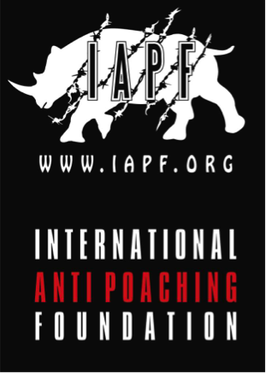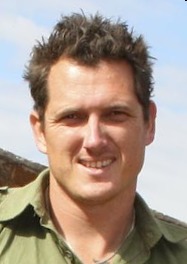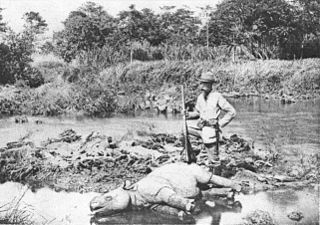Related Research Articles

Poaching is the illegal hunting or capturing of wild animals, usually associated with land use rights. Poaching was once performed by impoverished peasants for subsistence purposes and to supplement meager diets. It was set against the hunting privileges of nobility and territorial rulers.

Kruger National Park is a South African National Park and one of the largest game reserves in Africa. It covers an area of 19,623 km2 (7,576 sq mi) in the provinces of Limpopo and Mpumalanga in northeastern South Africa, and extends 360 km (220 mi) from north to south and 65 km (40 mi) from east to west. The administrative headquarters are in Skukuza. Areas of the park were first protected by the government of the South African Republic in 1898, and it became South Africa's first national park in 1926.
Zakouma National Park is a 1,158-square-mile (3,000 km2) national park in southeastern Chad, straddling the border of Guéra Region and Salamat Region. Zakouma is the nation's oldest national park, declared a national park in 1963 by presidential decree, giving it the highest form of protection available under the nation's laws. It has been managed by the nonprofit conservation organization African Parks since 2010 in partnership with Chad's government.

Garamba National Park is a national park in the north-eastern Democratic Republic of the Congo covering nearly 5,200 km2 (2,000 sq mi). It is among Africa's oldest parks and was designated a World Heritage Site by UNESCO in 1980 for its protection of critical habitat for northern white rhinoceroses, African elephants, hippopotamuses, and giraffes. Garamba National Park has been managed by African Parks in partnership with the Institut Congolais pour la Conservation de la Nature since 2005.

The International Rhino Foundation (IRF) is a Texas-based charity focused on the conservation of the five species of rhinoceros which include the White Rhinoceros and Black Rhinoceros of Africa, and the Indian Rhinoceros, Javan Rhinoceros and Sumatran Rhinoceros of Asia.
The Kruger National Park is a South African National Park and one of the largest game reserves in Africa. Originally known as The Sabi Game Reserve, it became a game reserve in 1898. The park became known as Kruger National Park in 1926, when it was named after Paul Kruger.

Akashinga, is a non-profit organisation registered in Australia, predominantly operating on the African continent. The group initially created a structured military-like approach to conservation, employing tactics and technology generally reserved for the modern-day battlefield, and has since moved to a community oriented approach. This has included the training of local women as rangers.

Damien Mander is an anti-poaching activist and the founder of Akashinga. He is a former Australian Royal Navy Clearance Diver and Special Operations military sniper. He is also a director of the Conservation Guardians. In 2019 he received the Winsome Constance Kindness Trust Gold Medal.

The SanWild Wildlife Sanctuary is a 5,000 ha (50 km2) wildlife rehabilitation center and reserve in South Africa's Limpopo Province, located a few kilometers south of Leydsdorp, and near the western boundary of the Kruger National Park.

Elephant hunting or elephant poaching and exploitation of the ivory trade are illegal in Chad and pose a major threat to elephant populations. The profitable ivory industry is also a threat to the lives of rangers, even in the national parks, such as Zakouma National Park, the worst-affected area.

TheBlack Mamba Anti-Poaching Unit is the world's first officially-formed, registered and recognised all-female wildlife ranger unit, founded in 2013, with the purpose of protecting wildlife in the regions of the Olifants West Nature Reserve, and the buffer zone in the Greater Kruger of South Africa. The Black Mamba APU was awarded the Champions of the Earth Award, in 2015, by the United Nations Environment Program (UNEP). In the period between 2013 and 2022, the Black Mamba APU has won 10 International awards, for innovative approach to wildlife conservation.

Many species are affected by poaching, including illegal hunting, fishing and capturing of wild animals, and, in a recent usage, the illegal harvesting of wild plant species. The article provides an overview of species currently endangered or impaired by poaching in the Americas, sub-Saharan Africa, and South-East Asia.
Wayne Lotter was a South African wildlife conservationist. Lotter was one of the co-founders of the PAMS Foundation, a not for profit conservation organisation based in Tanzania. Lotter also previously served as Vice President of the International Ranger Federation.
Big Life Foundation is a non-profit conservation organization focused on preserving the wildlife and habitats of the Amboseli-Tsavo-Kilimanjaro ecosystem of East Africa through community-based and collaborative strategies.
Gonarezhou is a 2019 Zimbabwean anti-poaching awareness film written and directed by Sydney Taivavashe. The film is produced in conjunction with the Zimbabwe Parks and Wildlife Management Authority.

Rhinoceros poaching in southern Africa is the illegal act of slaughtering rhinoceros in the southern African countries of Namibia, Botswana, Zimbabwe and South Africa, where most of Africa's rhinos occur. The most common reason for rhino poaching is to meet the high demand for their horns in Asian countries, where the horn is predominantly used in Traditional Chinese Medicine but is increasingly being used as a symbol of wealth and prosperity. In previous generations, the most common rhino poaching activity was hunting for recreational purposes. Because of excessive poaching, rhino populations have decline rapidly since the 1970s, leaving some species critically endangered and facing extinction.

Anti-poaching is the organised act to counter the poaching of wildlife. However, it is generally used to describe an overall effort against the illegal wildlife trade. The act of anti-poaching is normally carried out by national parks on public land and by private security companies on privately owned land. Anti-poaching takes many forms and which depends mainly upon the habitat being protected. Typically, it is the act of actively patrolling land in an effort to prevent poachers from reaching the animals.
Hemmersbach Rhino Force is a direct action conservation organization acting with a focus on the African rhinos. Rhino Force's main activities consist of anti-poaching rangers in the Greater Kruger National Park, a biobank called Hemmersbach Rhino Force Cryovault to preserve rhino genes and the Black Rhino Reintroduction to bring back rhinos to the Mid Zambezi Valley in Zimbabwe.
Tariro Mnangagwa is a Zimbabwean film producer, actress and conservationist. She is known for her role in the 2020 film Gonarezhou The Movie. Her producing credits include Gonarezhou The Movie [2020] and The Story of Nehanda. [2021], having starred in both movies. She is the youngest daughter of current Zimbabwean president Emmerson Mnangagwa and his first wife Jayne Matarise.
How Many Elephants is an anti-poaching conservation charity based in the United Kingdom. The charity supports female and mixed ranger teams in Africa.
References
- ↑ Edraki, Farz (2018-10-27). "Meet 'the brave ones': The armed, Australian-trained female fighters taking on poachers". www.abc.net.au. Retrieved 2020-12-10.
- ↑ Ratcliffe, Amy (2020-08-20). "Meet the All-Female Team Stopping Elephant Poachers". Nerdist. Retrieved 2020-12-10.
- 1 2 3 4 Nuwer, Rachel (2018-09-27). "Meet the 'Brave Ones': The women saving Africa's wildlife". www.bbc.com. Retrieved 2020-12-10.
- 1 2 3 Minutaglio, Rose (2020-08-12). "This All-Female Army Protects Elephants From Poachers In Zimbabwe". ELLE. Retrieved 2020-12-10.
- ↑ McMahon, Jeff (2020-12-09). "Wildlife Poaching On The Rise During The Pandemic That Wildlife Poaching Likely Caused". Forbes. Retrieved 2020-12-10.
- ↑ Froelich, Paula (2020-08-15). "An inside look at Zimbabwe's all-female, anti-poaching army". New York Post. Retrieved 2020-12-10.
- ↑ Steirn, Adrian (2017-12-17). "All female anti-poaching combat unit - in pictures". The Guardian. ISSN 0261-3077 . Retrieved 2020-12-10.
- ↑ Ramos, Dino-Ray (2020-04-15). "'Akashinga: The Brave Ones' Trailer: James Cameron's Docu Sheds Light On All-Female Anti-Poaching Unit In Zimbabwe". Deadline. Retrieved 2020-12-10.